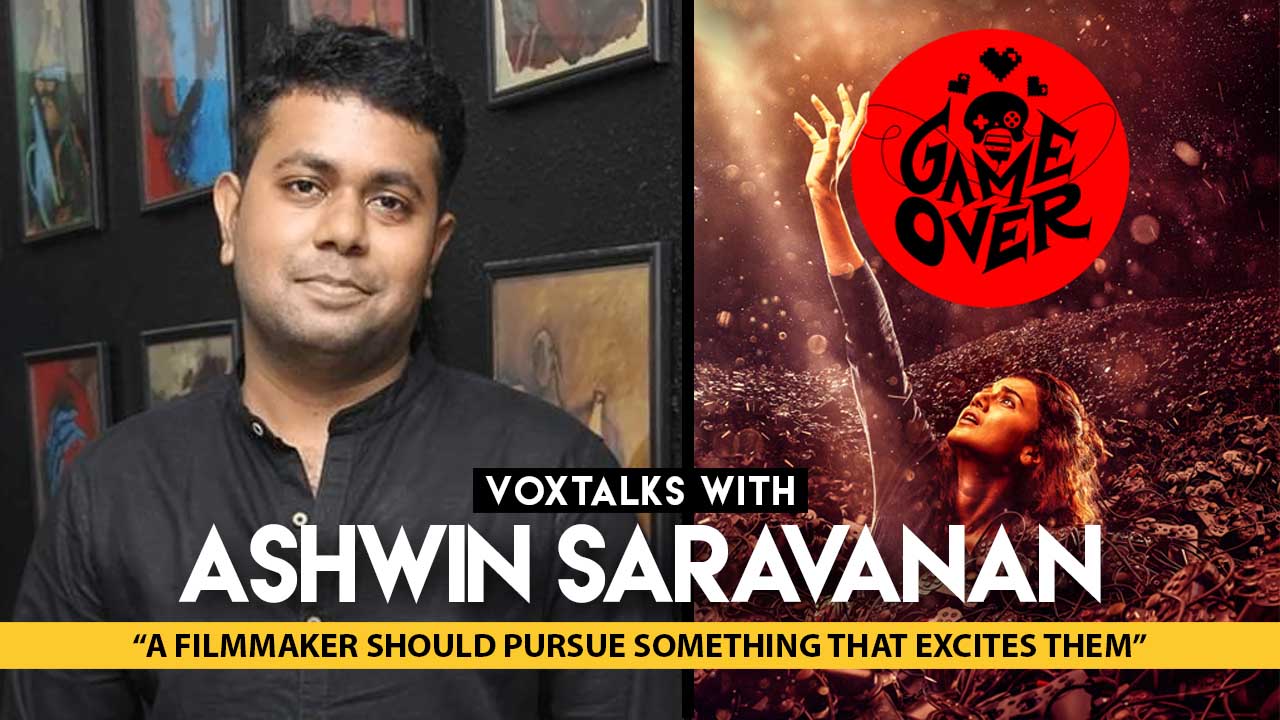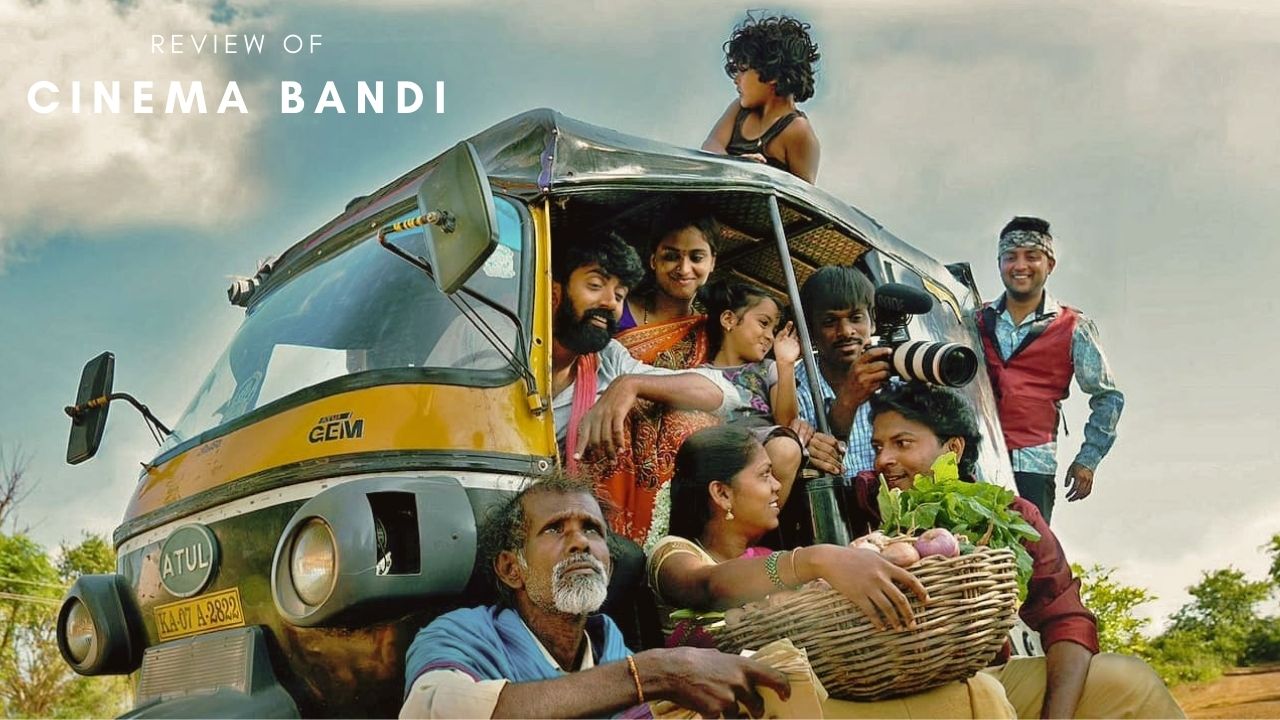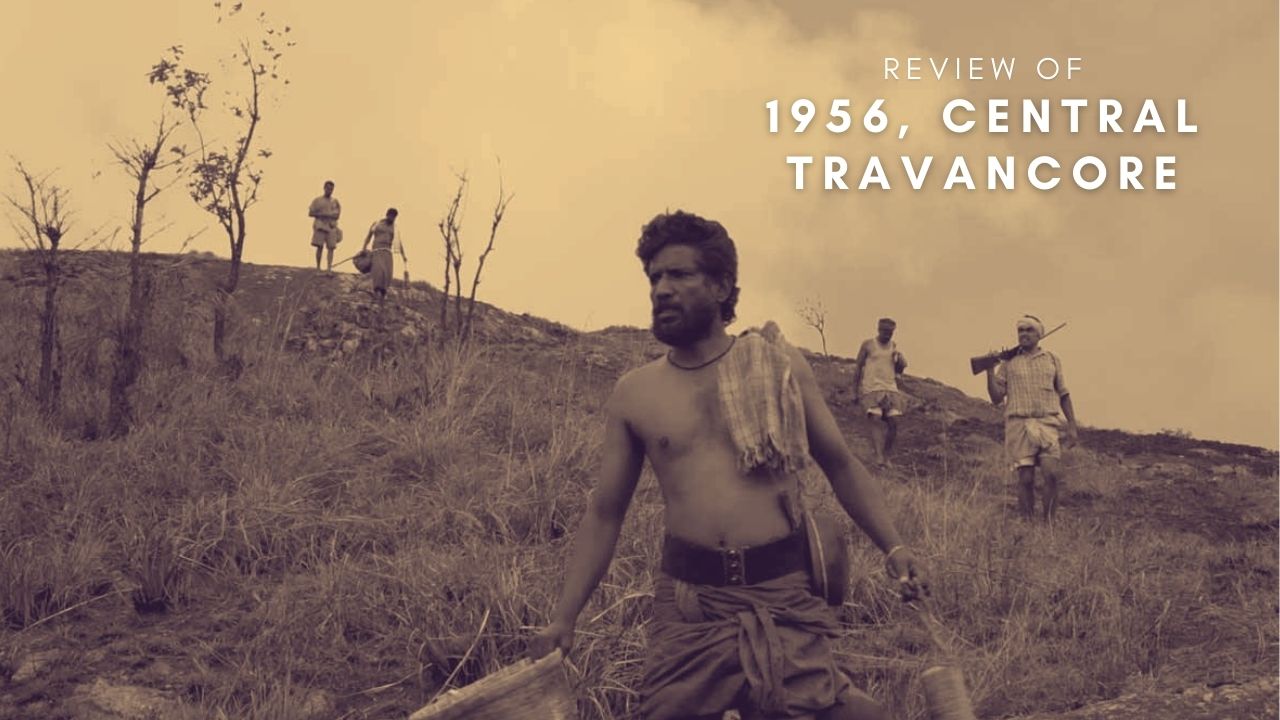
Ashwin Saravanan : Telling Bizarre And Crazy stories, The Scary And Thrilling Way
Ashwin Saravanan, the director of the nail-biting thriller films ‘Game Over’ and ‘Maya’ spoke to us in length about the process behind-the-scenes. Known for his crisp and sharp screenplays, Ashwin Saravanan also opens up about his close collaborations with actors, cinematographers, production designers, sound designers, costume designers and Ron Ethan, music composer.
He also explains the importance of planning in pre-production and including technicians from the initial stages to have a smoother execution of the shooting process. Here are a few excerpts from the interview:
Congratulations on the success of Game Over. Really loved it. How did this journey as a filmmaker start?
I’ve always been interested in stories. My mother introduced me to reading a lot of books at a very young age. I have always been fascinated of stories and storytelling, in general. During my 10th standard, I used to write short stories and gradually, started developing my writing skills. Even during my college days, I continued to write extensively. It was usually amateur short stories that you write when you start out. I wrote them for myself and shared it with very few people and wasn’t in the search of an audience. I enjoyed the writing process, brainstorming ideas and coming up with unique and bizarre stories. Since I wrote for a self-satisfactory reason, I never really expected anyone to like it and give me feedback. It was only in my 11th standard that I was introduced to films because in our family, we hardly watched films, maybe once in a year, something like Jurassic Park perhaps, and I was not encouraged either.
Once I began watching films, I realized slowly that films are another completely different way or medium of telling stories. That part of filmmaking excited me – the possibility of telling a story visually and reaching out to as many people as possible, your story being viewed on the big screen, people watching it like a communal experience and people reacting to it really attracted me as a storyteller. When I was in college, I slowly started converting my short stories into short films. Gradually, I got addicted to this and this exercise led to me diving into filmmaking full on.
How is the process like when you get co-writers on board for a thriller film like Game Over? And what is your writing process like?
Game Over is my third film and this is the first time I collaborated with another writer. Kaavya Ramkumar is a writer I found online. I read some of her short stories online and reached out to her. She has a very unique voice and we started talking about different things and decided to collaborate sometime soon. Together, we had written a script but that hasn’t been produced yet due to budget reasons. While we were looking for a production company to mount that film, we came up with the idea of Game Over, which would be a relatively smaller film to execute. We were likely to finish the film in 6-8 months which was the scope and nature of the film. Fortunately, this film got picked up first and we ended up finishing it. It was a really good experience working with another writer, obviously, there will be different perspectives on the same story and conflicting voices which will lead to something that’s 3-dimensional and challenges your creative perceptions on the subject matter. The collaboration was very healthy, challenging and ultimately, very rewarding for me as a writer. I’m really looking forward to collaborate with more writers and truly enjoying the process.
Finally, writing comes down to that idea in your mind that excites you, that single concept that gives you a high. That’s the high a filmmaker looks for while conceiving an idea and tries to give the same experience to his/her audience. That’s when I know it’s a good idea and this drives me to work it out completely. Once I get an idea, I write a one-pager and expand it into a 4-page treatment. After that, I work on the one-line order that basically lists down every single scene that comes in the film. Then, I expand each and every scene and work on the dialogues in the end. It’s different for different films, depends on the subject matter but this is the general structure I follow when I’m fleshing out a script.
When I watch my own films, I’m not filled with that high because I would have watched it 1000 times. But when I watch it in the theatre and watch the audience’s reaction, it makes me happy but I don’t feel anything per say.
Usually Indian films are dialogue oriented, but Game Over has more show than tell. How did you manage to pull it off?
That was always the idea. My vision for the film is to make a film any Indian can watch and relate to. I really wanted to cross over the language barriers and tell a visual story that has a very universal language of cinema, rather than getting too much into dialogues. The objective was to make the film which anybody could understand even if they mute the film and watch. That’s why we focused more on the visual storytelling part of it. Writing dialogues is an art and some people are masters of it and I do enjoy films that play around with dialogues like Tarantino’s films, but in this particular film, we tried to push the limits of visual storytelling and most of all, ensure that it’s a visual experience.
The way you use trolley shots and closeups are very claustrophobia inducing. How do you work on shot division and production design to create that effect/impact on your audience?
I’m very fascinated by visual storytelling devices like- working with colours, moods, fabric and costume et al. I’m eternally captivated by how you put together all those elements and elicit an emotional response from the audience. As a filmmaker you are not only telling a story but, you are also trying to evoke an emotional response from your audience by using a certain shot, colour, mode or spatial difference to get that emotional beat/note right. I work very closely with my cinematographer, production designer and costume designer and with the help of references, I communicate to them clearly about my vision and requirements for each and every particular scene. After various discussions with them, we decide upon a colour palette, mood and texture for the entire film.
Working on the costumes, set design and shot divisions etc., is my favourite part of pre-production. It gives me a kick when we come up with interesting and clever visual ideas that will eventually be executed by the team. It is a very elaborate process and I take my time to plan everything accordingly and so far, I’ve had a great experience working with my technicians who have understood and contributed to my vision. It has been a creatively satisfying journey for me from setting the visuals and achieving that quality on screen.
The sound design in your films, especially Game Over, made me feel uneasy. How do you work on the sound design and how much of the final soundscape is scripted?
I write down all the sound cues in the script. The Sound Design team gets involved right from the scripting stage. They understand the requirements right from the beginning. For all my 3 films, I’ve worked with this sound design company called Sync Cinema (Sachin Sudhakaran and Hariharan). I strongly believe that – A film with bad video but great audio will work rather than the other way around. I have always carried this belief with me right from my short film days and have been meticulous about the sound in my films.
The psychology behind sound design to create the right mood and emotion is an under-appreciated art. I hope someday the audience will realize and appreciate the efforts that go behind to create the soundscape for a film. The sound mixing for my films has been done by Mr. Radhakrishnan, who also won the National Award for Best Sound Mixing for Rangasthalam. I work very closely with him and he is a brilliant technician who’s taught me a lot and it has been a remarkable experience with him, so far. Going to the mix studio and listening to the final sound mix of the film, and witnessing the entire film shaping up is my favourite part of post-production.
What is the process like when you sit with your composer, Ron Ethan while composing the background score? At what point in the production does he come into the picture?
I’ve been travelling with him for 5 years now, since Maya. He is with me from the inception of the idea. As soon as I come up with one, I call him up and narrate the concept to him. Sometimes, both of us are excited about the idea and sometimes he isn’t very convinced. For almost all my films, he has given me the background score even before the shoot begins. As soon as I finish the script, I give it to him and he starts composing scene wise and thematically as well. When I go for the shoot, I’ll be listening to the music and sometimes, edit on the spot accordingly. Even before the actual post-production starts, we use these musical cues to edit and do not use references. After the film is completely edited, he’ll see if he can improvise and change the approach and work on the nuances. We have established a co-creator sort of place where we create parallelly.
Taapsee Pannu as Swapna obviously looks really intense and emotional throughout the film. What was your direction to her and how did you manage to keep her sane throughout the shoot?
She is a very happy and cheerful person, in general. I really did not take a lot of effort to put her through anything. She is a great actor and she understood the vision and material well enough. She knew the requirements of the film and we never had to stress her or ourselves out for anything. She was cool and chilled out throughout the shoot, in fact, she was playing Ludo with the team. During the intense scenes, she transforms and captures that intensity easily and does not take a lot of time to get into it. She is not a method actor who has to stay in the mood to deliver. She can switch back and forth into different moods very comfortably. We had a script reading before the shoot started and we discussed in length, about each scene and what it required. She does it with ease actually; during the shoot, she walks in, we stage the scene and she starts performing, it’s done within 2-3 takes, and we move onto the next scene. All the discussions happen before the shoot and not during, so that way we all know what we need to do on set.
Why did you name her Swapna? Was it intentional?
Yeah, you can say that. We felt that it related to the theme and idea of the film. Yes, it was intentional.
And the character Swapna being a gamer, was it from a personal space or experience?
I enjoy playing video games, probably yes, the idea and the way the narrative is structured has a thing to do with my fascination with video games.
I believe that horror can be used to bring really relevant societal issues in very a subversive way unlike any other genre. Why do you think filmmakers don’t normally use it in that way, instead of cheap jump scares?
You can scare people just for the sake of it. The Horror genre does not have to pertain itself to a certain subject matter. There are social-horror films like Get Out, Rosemary’s Baby and there are these demonic possession films like Conjuring, Insidious. I think the horror genre itself is a broad spectrum of different sub-genres that encompasses different films and voices from across the world. Honestly, I don’t know the reasons why it is not done in Tamizh films; but I personally get a kick out of it, and I think I have an understanding of the genre and fascinated by the horror voices around the world.
I watch a lot of horror films and understand why they work. I’m a huge fan of Stephen King and read his novels. My passion for horror stems from my childhood and has always been there since. If someone comes up to me and hands me a comedy script, I might not know how to execute it. I might learn to do it but right now, I don’t know how to go about it. I think it’s the fascination for the genre that lends itself to the script and the story you are trying to tell. It’s the filmmaker’s choice and they should pursue something that excites them rather than thinking of how to stay socially relevant and what kind of a message can I infuse in the story to convey to my audience. It’s more important to tell a story that excites you more than anything else.
For a person who only wants to direct, do you think the scope for that is improving in the Tamizh industry?
It’s interesting. When you walk into a production house, you cannot tell them that you’re a very good director and just ask for a script to direct it. That is not going to happen. Unless you can find a writer even before you make your first film, develop a material with them and pitch it to the producer together, it is a different case. You have better chances of getting work through that method. I really hope the scope expands because directing itself is a challenging job even though you don’t have to write. It’s important to understand that- writers are writers, and direction and writing are two different jobs. It shouldn’t be necessary to be a writer-director. Direction itself is such a humongous task and you have masters like Alfred Hitchcock, Martin Scorsese, David Fincher, etc. and all these people prefer directing over writing. There is absolutely nothing wrong with sticking to the craft of Direction at all.
Out of curiosity, I wanted to ask why you didn’t reveal the identity of the stalker in Game Over. What was the intention behind the open-ending?
The film is about Swapna and revolves around Swapna fighting her innermost demons. It is a subjective take on her condition and journey as a person. There was really no need to explain who those killers were, otherwise it becomes a different film altogether. It was not about keeping the film abstract and metaphorical, the choice was taken consciously based on whose perspective we took, to tell the story. It was Swapna’s story and whatever you experience is through her lens, rather than you looking from the above. It is not a bird eyes’ view of the whole narrative and it is about going through her emotions through her prism. Since it is a very subjective material, I did not want to focus on anything else apart from Swapna.
FUN QUESTIONS –
Favourite films?
It is such a big list; I can tell you genre wise.
Horror : The Exorcist, Rosemary’s Baby, Conjuring, Get Out, Seven (People will argue that it is a crime drama but for me personally, it is a horror film)
Romance/Drama : Notting Hill, The Holiday, 500 Days Of Summer, Vinnaithaandi Varuvaaya, Mouna Raagam
Favourite filmmakers?
Martin Scorsese, David Fincher, Christopher Nolan, Mani Ratnam, Manikandan
Favourite Video Games?
Assassin’s Creed, Resident Evil Series, Max Payne, God Of War Series.
Unique and Best Feedback?
Filmmaker Sashi watched my film Maya and gifted me a book, with a handwritten note saying that he really loved the film and was moved by it.
What are your future projects? Any more genres you’re willing to explore?
I think it is a little early to reveal anything because they are in their initial stages. We will be announcing it in a couple of months though.
Iraava Kalam, when can we expect the film to release?
I thought this would have been your first question actually. Honestly speaking as a director, you only have certain control over when and how to make the film and plan to release it. It finally comes down to the production company and it is their job to ensure that the film is finished and released. I hope they resume the film and release it soon. I really can’t talk about when it’s going to happen and give you a date because I, myself don’t know. It really is one of my special films and it breaks my heart that I’m unable to share that film with the rest of the world.
We wish him all the very best for his future endeavours.














